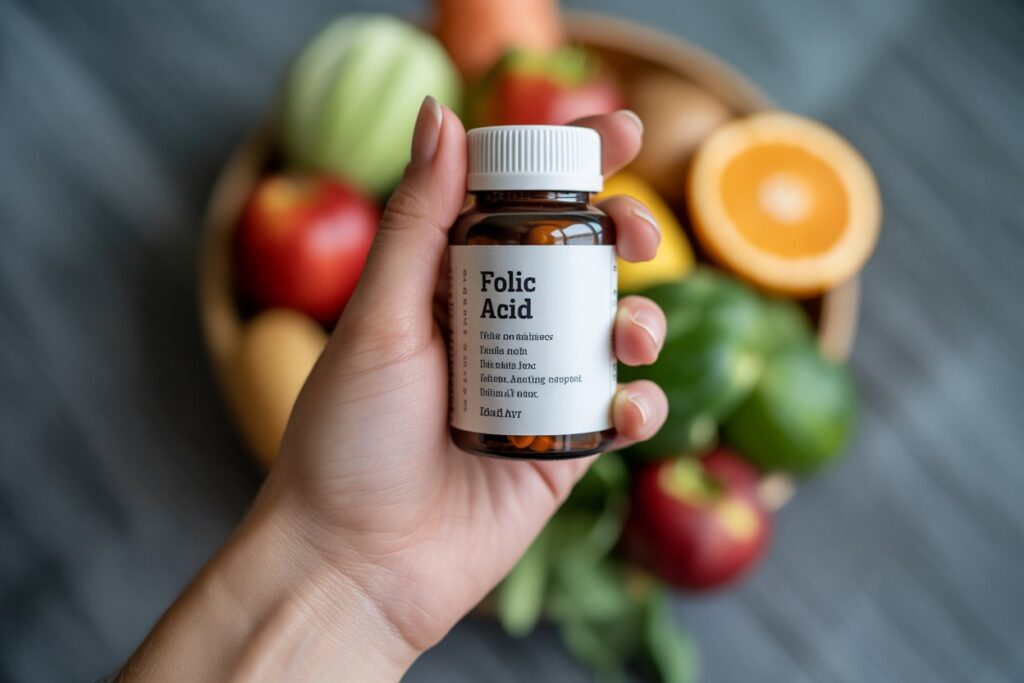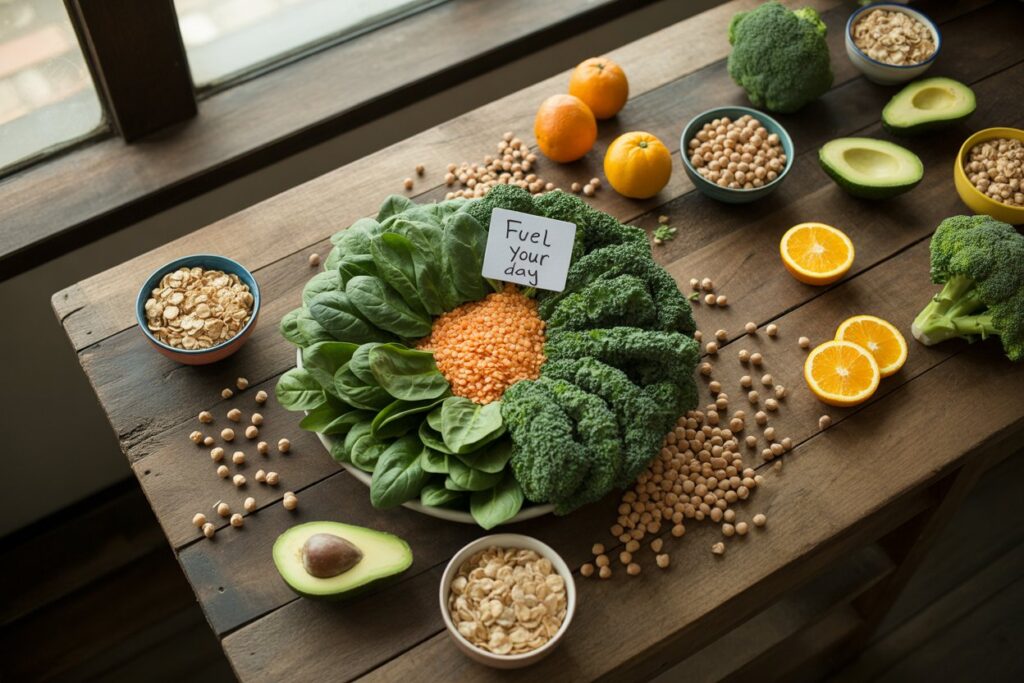Pregnancy is one of the most transformative journeys a woman experiences in her lifetime. Alongside the excitement of planning a new life, it comes with numerous responsibilities—diet, lifestyle changes, regular health check-ups, and the crucial task of ensuring proper nutrition. Among all the nutrients essential for a healthy pregnancy, folic acid stands out as one of the most critical.
Even though it’s a simple vitamin, folic acid carries profound significance. Taking folic acid tablets during pregnancy is widely recommended by doctors because it ensures the healthy growth and development of the baby while protecting the mother from certain complications. Yet, many women still overlook its importance, thinking it’s just another supplement. In reality, missing this small step can lead to lifelong consequences for your baby.
This blog will help you understand why folic acid is so crucial, when to start taking it, how much to take, and practical ways to incorporate it into your daily routine.
What is Folic Acid and Why It’s Essential
Folic acid is the synthetic form of folate, a water-soluble B-vitamin (Vitamin B9) that plays a vital role in cell growth and DNA formation. During pregnancy, your body undergoes rapid changes: your blood volume increases, your organs work harder, and most importantly, a new life is forming inside you. Folic acid ensures that every new cell in your baby’s body develops properly.

The first few weeks of pregnancy are the most critical, especially for the development of the neural tube—the structure that eventually forms the baby’s brain and spinal cord. If there is insufficient folic acid during this period, serious birth defects such as spina bifida (incomplete spinal formation) or anencephaly (absence of major parts of the brain and skull) can occur. What makes this even more concerning is that these defects often develop before a woman even knows she is pregnant.
Therefore, taking folic acid tablets during pregnancy and even before conception is not just a precaution—it’s a crucial step to protect your baby’s future health.
Why You Should Start Folic Acid Before Conception
A common misconception is that prenatal supplements can be started only after confirming pregnancy. However, the most critical stage for neural tube development happens during the first 28 days after conception—often before a woman even realizes she is pregnant.
Starting folic acid tablets before conception offers several advantages:
- Protects Early Neural Development: By the fourth week, the neural tube closes, forming the brain and spinal cord. Early supplementation ensures this happens properly.
- Reduces Maternal Risks: Folic acid helps prevent anemia, a common problem during early pregnancy, reducing fatigue and weakness.
- Supports Egg and Sperm Health: Folate also improves DNA synthesis in eggs, contributing to better conception outcomes.
For these reasons, gynecologists recommend women planning pregnancy to begin folic acid at least three months in advance. This proactive approach sets the stage for a healthy start. According to the CDC, folic acid is crucial before and during pregnancy to prevent neural tube defects and support healthy fetal development.
The 6 Benefits of Folic Acid Tablets During Pregnancy
Taking folic acid tablets during pregnancy is not just about preventing neural tube defects. The benefits extend to overall maternal and fetal health:
1. Ensures Proper Brain and Spinal Cord Development
The most well-known benefit of folic acid is its role in preventing neural tube defects. Studies show that women who take adequate folic acid before and during early pregnancy reduce the risk of these defects by up to 70%. Beyond preventing defects, folic acid contributes to healthy brain development, laying a foundation for better cognitive function in the child.
2. Supports Red Blood Cell Production
Pregnancy increases blood volume by nearly 50%, creating higher demand for red blood cells. Folic acid plays a key role in forming these cells. Without enough folic acid, mothers may develop anemia, leading to fatigue, dizziness, and even complications during delivery.
3. Strengthens the Placenta
The placenta is your baby’s lifeline, supplying oxygen and nutrients essential for growth. Folic acid supports proper placental formation, ensuring efficient nutrient transfer and a stable environment for your developing baby.
4. Reduces Risk of Preterm Birth and Low Birth Weight
Research indicates that folic acid supplementation lowers the chances of premature birth and low birth weight, two factors associated with long-term health challenges. Babies born at normal weight are less prone to infections and have a stronger immune system.
5. Protects Against Congenital Heart Defects
Recent studies suggest that folic acid may also reduce the risk of certain congenital heart defects, highlighting its broader importance in fetal organ development.
6. Supports Maternal Mental Health
Emerging research links folic acid to reduced risk of maternal depression. Adequate folate levels help regulate mood by supporting neurotransmitter synthesis, which is crucial during the hormonal changes of pregnancy.
How Much Folic Acid Do You Really Need?
The recommended dosage depends on your individual circumstances:
- Before conception and early pregnancy: 400 micrograms (mcg) per day
- During pregnancy: 400–600 mcg per day
- High-risk pregnancies: Up to 4 mg daily, as prescribed by a doctor
It is important to consult your healthcare provider for the correct dosage. Taking too little may not provide benefits, while excessive doses can mask vitamin B12 deficiency or cause other complications.
Best Natural Sources of Folate
While folic acid tablets during pregnancy are essential to ensure you meet daily requirements, pairing them with folate-rich foods provides additional health benefits for both mother and baby. Folate from natural sources not only supports fetal development but also supplies fiber, antioxidants, and other essential nutrients that promote overall maternal health. Here’s a closer look at the best sources:

1. Dark Leafy Greens
Dark leafy greens such as spinach, kale, fenugreek (methi), and mustard greens are packed with natural folate. These vegetables are also rich in iron, calcium, and vitamins A, C, and K, making them excellent for supporting both maternal health and fetal growth. Incorporating them into your daily diet—whether as salads, sautéed dishes, or in smoothies—can boost your folate intake naturally while adding essential micronutrients.
2. Legumes
Lentils, chickpeas, black beans, and kidney beans are not only great sources of folate but also provide plant-based protein and fiber. These foods help maintain healthy digestion, prevent constipation (a common issue during pregnancy), and keep blood sugar levels stable. A simple lentil soup or chickpea salad can be a convenient and delicious way to increase folate intake.
3. Fruits
Certain fruits like oranges, papaya, avocados, bananas, and berries contain moderate amounts of folate, along with antioxidants and vitamin C, which help improve iron absorption. Eating a variety of fruits daily supports your immune system, prevents oxidative stress, and keeps both you and your baby energized. A fruit smoothie with spinach and avocado can be a nutrient-packed breakfast or snack.
4. Fortified Cereals and Bread
Many breakfast cereals and bread products are fortified with folic acid, making them a reliable source of the nutrient. Check the nutrition labels when shopping—fortified cereals often provide 100% of the recommended daily folate per serving. Pairing them with milk or yogurt adds protein and calcium, creating a balanced start to your day.
5. Vegetables
Vegetables like beets, asparagus, broccoli, and Brussels sprouts are also excellent sources of natural folate. These vegetables contain antioxidants, fiber, and other vitamins essential for pregnancy. Including them in stir-fries, roasted dishes, or soups ensures you get a variety of nutrients while boosting folate intake.
Practical Tips for Expecting Mothers
Taking folic acid tablets during pregnancy is simple, but consistency and the right approach can make a significant difference. Here’s a deeper look at how expecting mothers can get the most benefit:
1. Start Early
One of the most important steps you can take is to start folic acid even before you conceive. Neural tube formation occurs in the first 3–4 weeks of pregnancy—often before you know you are pregnant. By beginning supplementation early, you give your body time to build adequate folate levels, ensuring your baby’s brain and spinal cord have the nutrients they need from day one. If you’re planning pregnancy, make folic acid part of your daily routine alongside other healthy habits like a balanced diet and regular exercise.
2. Be Consistent
Consistency is key with folic acid. Taking your tablets at the same time every day helps maintain steady levels in your body. Some women find it helpful to set a daily reminder on their phone, keep tablets near their toothbrush, or incorporate them into a morning routine. Skipping doses or taking them irregularly reduces effectiveness and may leave your baby vulnerable during critical developmental stages. Think of it as a small, daily investment in your baby’s long-term health.
3. Combine with a Balanced Diet
While supplements are essential, combining them with folate-rich foods amplifies their benefits. Include dark leafy greens like spinach, kale, and fenugreek; legumes such as lentils and chickpeas; and fortified cereals or breads. Citrus fruits, avocados, and beets are also excellent additions. Eating a variety of these foods not only boosts folate intake but also provides other nutrients such as fiber, vitamins, and minerals, supporting overall maternal health. Remember, supplements complement your diet—they don’t replace the need for wholesome foods.
4. Consult Your Doctor
Every woman’s body and pregnancy journey is unique. Consult your doctor before starting or adjusting your folic acid dose, especially if you have pre-existing conditions like diabetes, epilepsy, or thyroid disorders. Your doctor can recommend the right dosage based on your health profile, previous pregnancies, and family history. In some high-risk cases, a higher dose may be necessary, but it should always be guided by a professional to avoid potential side effects.
5. Pair with Other Nutrients
Folic acid works best in combination with other essential nutrients. For example:
- Iron supports red blood cell production and prevents anemia.
- Vitamin B12 works with folic acid for DNA synthesis and proper neurological function.
- Calcium and Vitamin D strengthen bones for both mother and baby.
Taking a prenatal vitamin that contains a balanced combination of these nutrients can simplify supplementation and ensure you’re not missing any vital elements for a healthy pregnancy.
6. Monitor and Track Your Progress
Keep a simple journal or use a period/pregnancy tracker app to record your daily folic acid intake. Tracking helps ensure you’re consistent and provides a reference for your doctor during check-ups. Some apps even send reminders and allow you to log other nutrients, hydration, and symptoms, making it easier to maintain a holistic approach to pregnancy health.
7. Lifestyle Integration
Folic acid supplementation is most effective when paired with a healthy lifestyle. Moderate exercise, stress management techniques such as yoga or meditation, adequate sleep, and avoiding smoking or alcohol can enhance nutrient absorption and overall pregnancy outcomes. Think of folic acid as part of a broader lifestyle commitment that supports both you and your baby.
Common Myths About Folic Acid
- “I eat well, so I don’t need tablets.” While diet is important, supplements guarantee you meet the exact requirement every day.
- “I can start after I’m pregnant.” The first month is critical; late supplementation may not prevent defects.
- “High doses are better.” More is not always better. Follow your doctor’s advice to avoid complications.
Real-Life Scenario
Imagine two women: one starts folic acid while trying for a baby, and the other waits until after confirming pregnancy. The first woman ensures her baby’s brain and spinal cord develop correctly in those first vital weeks. The second woman, although taking supplements eventually, may miss the crucial early window, increasing the risk of birth defects. This simple choice—starting early—can make a lifelong difference.
Conclusion
Motherhood is about making informed choices that protect your child’s health even before birth. Among these choices, taking folic acid tablets during pregnancy is one of the most impactful. It prevents birth defects, supports maternal health, improves birth outcomes, and promotes overall fetal development.
If you are planning pregnancy or are already expecting, start your folic acid supplementation today. Pair it with a nutrient-rich diet, stay consistent, and consult your doctor for personalized guidance. A small daily step today can ensure a healthy, happy start for your baby tomorrow.







